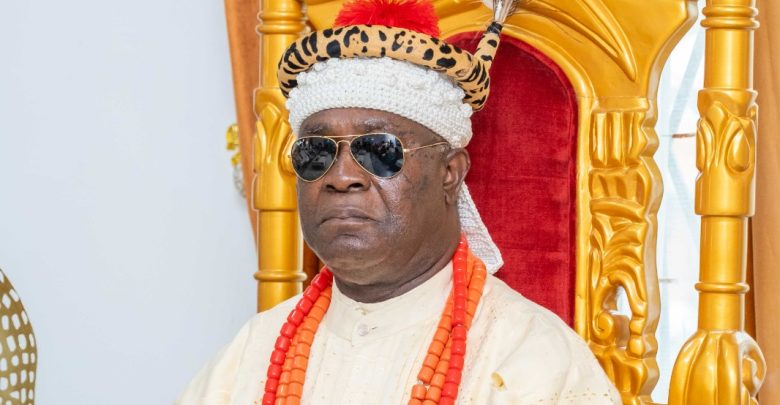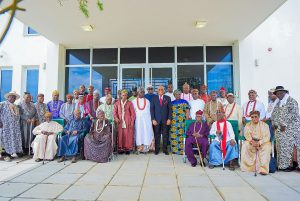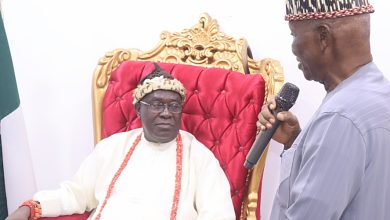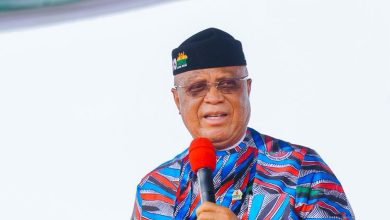
Days have gone by since the October 16, 2023, meeting of the traditional rulers’ council and stakeholders from Annang, Oro, and Obolo ethnic groups held at the Ati Annang International Secretariat, Ikot Ekpene.
Traditional rulers in their categories and stakeholders from these groups met to amplify their concerns over the leadership structure of the Supreme Council of Traditional Rulers created by the Akwa Ibom State amended Traditional Rulers Law, Cap. 155 of 2022.
Before that converge, the Governor, Mr. Umo Eno, had at the state’s 36th anniversary Thanksgiving urged dissatisfied Paramount Rulers to write their objections to the amended law to him. That would have sufficed. But, 21 days later, there was what would come to be known as the October 16 converge in Ikot Ekpene.

The October 16 convergers reiterated their objection to the leadership structure of the Supreme Traditional Rulers Council. That was okay. Everyone has the right to meet and to hold an opinion. The converge dished out a statement laced with debasing descriptives about the ancient and ancestral throne of the Ibibios. The convergers insulted the President General of the Supreme Traditional Rulers of the State, specifically the throne of the Supreme Traditional Ruler of the Ibibios.
In their communique circulated by online media platforms, the traditional rulers and stakeholders of Annang, Oro, and Obolo referred to the sacred traditional throne of the Oku Ibom Ibibio and the Ibibios, thus: “the so-called throne of the Oku Ibom Ibibio”, “Ibibio, the purported largest ethnic group in the state.” These expressions were intentionally directed at the Oku Ibom Ibibio and the Ibibios to demean, degrade, spite, and trivialise them. But it should not be overlooked. The Oku Ibom Ibibio throne is a revered, premier traditional stool of the Ibibios, counted as the fourth largest ethnic group in Nigeria. The Ibibios are one of the earliest inhabitants of southern Nigeria, with a formidable institution (the Ibibio Union) that led to demands for sovereignty from British colonialists. Its elite institution, the Ibibio Union, had global influence and reverence. The throne of her king (Oku) is well established. It is not imaginary.
Related: We are Sorry – Annang, Oro Paramount Rulers Tell Gov Umo Eno
No group would love to hear the throne of her king or kingdom talked down on in the manner the converge did. No one from Annang, Oro, or Obolo has repudiated those vexing expressions. Maybe it was deliberate, and everyone is comfortable with it. That attempt to trivialise the throne of the Ibibio supreme traditional ruler was distasteful and a dishonour. Whatever was at stake, no right-thinking person anywhere should sanction such an abrasive description that came from the converge. The Oku Ibom Ibibio, Itai Afe Annang, Ahta Oro, and other traditional rulers in their ilk should be revered and their thrones respected.
The Ibibios are the majority. That’s a self-evident truth reinforced by the vernacular phrase “Ibibio edo Akpan”, transliterated as “Ibibio is the firstborn”. The Ibibios have played the big brother role for other groups in the state with a touch of fatherly love. There is no report in documented history that the Ibibios’ relationship with other groups pre- and post-state creation was oppressive or discriminatory. They have upheld the nearly century-old bond, oneness, and history anchored on the Ibibio Union’s movement. The Ibibios are accustomed to broadly inferring that every indigene of the state is an Ibibio—an internalised effort to break group biases and discrimination and promote collectivity and unity—regardless of the slight dialectical differences in some of the communities.
The small communities would not have that. They seek to be known by tribes, ethnic groups, and nationalities. They have, as individual ethnic groups sought their state. Some have sought to join others elsewhere. It is not the traditional rulers’ law that has “fragmented” the state. It is the small groups throwing up individuality. The October 16 assembly was unfair in seeking to hold the traditional rulers’ law to account for the fragmentation of the state. It was incorrect to blame it on the law. Not after the converge acknowledged in paragraph 19 of its communiqué that “Oron tribe, Annang tribe, Ekid tribe, and the Obolo tribe were and are never part of the territories under…” the Ibibio traditional ruler.
The Governor, Mr. Umo Eno, has shown immense respect to the traditional rulers since a few of them kicked against the structure of the supreme council. That respect is not reciprocal. The governor’s unchanging disposition to unity, peace, love, oneness, and togetherness despite acts of insubordination by the royal fathers is commendable. The protesting royal fathers shunned a meeting convened by the governor to discuss their concerns. They equally rebuffed the governor’s September 24 call on them to convey their concerns through writing.
Read Also: Assembly of Clan Heads Backs Oku Ibom Ibibio As PG Of A’Ibom Apex Traditional Council
Though they reportedly apologised and regretted their conduct at a subsequent meeting, the royal fathers have set a bad precedent. They have allowed politicians and people who have no business with the operations of the traditional institution to infiltrate their ranks. They have allowed people who see crisis as the only way to peace to speak, act, and write for them. I can vouch that the October 16 communique did not originate from traditional rulers but from people to whom they gave their imprimatur. Infiltrators don’t speak peace. Their approach and words are always intended to escalate conflict, fuel disaffection and disharmony, injure, bruise, and destroy. This is not the style of royalty. Communication originated by royalties is always graceful and peace-seeking.
The traditional institution is unique. It is sui generis in its origin and philosophy and different operationally from political groups. Endoculturation, entrenched values, and taboos make the institution unique. This is why political solutions always fail to fix traditional issues. They always deal with and cause death, more death, and chaos. For instance, there are families in many communities in this state who are traditionally “unfit” to seek or produce a village head. Their unsuitability and unworthiness are defined by tradition and passed down through generations. Whether they are the wealthiest or most educated in the community is immaterial and inconsequential. Some families are traditionally “unworthy” to perform sacred traditional rites. If one tries to use modern political methods to change the status quo, it will result in plagues, hardships, and other serious consequences. Do members of those exempted families die? Does it stop their prosperity? Does that make them less human than others? The answer is no. The traditional institutions at the state level are liberal and representative. In communities, cases abound where tradition has its way, just like the majority would have their way in a democracy.
The majority has had their way with the amended law. On Tuesday, October 17, 2023, 18 of the 31 Paramount Rulers issued a joint statement supporting the amended traditional rulers law and the structure of the Supreme Traditional Rulers Council. The statement widely published in the media was signed by the Paramount Rulers of Nsit Ubium, Udung Uko, Ibiono Ibom, Ikot Abasi, Itu, Esit Eket, Oron, Mkpat Enin, Eket, ONNA, Ibesikpo Asutan, Nsit Ibom, Uyo, Nsit Atai, Uruan, Ikono, Ini, and Etinan. Those who objected to the structure lost an opportunity. They would have lobbied more Paramount Rulers to have the majority on their side instead of asking their women to go on a street protest.
Many times, protests do not solve a problem. Remember the #EndSARS? Has it stopped police brutality? No doubt, protesters can win sometimes. But not on this issue. The traditional rulers’ law will not be amended merely because people protested on the streets. What business do the street protesters have with the TRC? Do they have the power to vote in the conclave of Your Royal Majesties? It is the Governor or the majority of the Paramount Rulers that can cause the House of Assembly to amend that law. Even the House of Assembly as currently constituted cannot amend that law on its own. Of course, the Speaker will not have a majority vote to veto the amendment if the Governor withholds it. People should learn to select their fights. You don’t go boxing the breeze.
Politicians and “stakeholders” should not suffocate traditional institutions. They should allow our royal fathers to run their affairs and co-exist harmoniously. They understand themselves better than those shouting, “We no go gree!” on the streets. The amended law, which creates the Office of the President General (PG) of the Supreme Traditional Rulers Council, covers all interests in a representative capacity. The law states that the supreme traditional rulers from Annang (Itai Afe Annang) and Oro (Ahta Oro) shall assist the PG in policy formulation and administration of the council. The PG has no exclusive powers and functions in the law, but the supreme council. The amended law has elevated the Oku Ibom Ibibio, the Itai Afe Annang, and the Ahta Oro. Among the three, one of them must lead the council. Rightly, the traditional ruler chosen by the largest number of Paramount Rulers should lead at that level. In this case, the Oku Ibom Ibibio, which is selected by 18+ Royal Majesties, Akwa Ibom traditional institutions at the village level run a leadership-by-selection style.
That is what makes it Republican. A republican system is one where sovereignty rests with the people or their representatives. The concept of “republican” has been misunderstood, broadly misused, and misapplied connotatively and erroneously to imply what it is not. A republican system recognises leadership through representation.
And that is how the Akwa Ibom traditional institution runs—a system of leadership by representation. From family, village, lineage, clan, and local government to the state The amended traditional rulers law is not creating monarchies.




